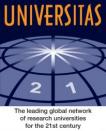Research Universities and their Regions (RUR)
Introduction
Research Universities, active in the global arena, share common aspirations to contribute internationally, nationally and within their regions to intellectual, cultural, social and economic advancement. Within their regions they exist in juxtaposition with other Universities and Higher Education Institutions whose mission is less broad and founded more clearly within their geographical region. The project was set up under the aegis of the Universitas 21 network of research-intensive universities.
Whilst all U21 Universities feel a strong commitment to their geographical region they differ in how this commitment is expressed within their strategic documents, how it is executed, managed and monitored at an operational level and in how they engage with other HEIs within their region. There appears to be no clear picture of the way an international research university should or could engage with its region for its own and its region’s best advantage.
 It was the Universities of Auckland, Glasgow and Melbourne who were awarded funding in 2009 to establish a U21 interest group of academics within the fields of Lifelong Learning, Regional Development and cognate disciplines to share strategic vision, best practice and engage in benchmarking activities. The focus was to be on effective knowledge transfer, 3rd mission activities, and other engagements that contribute to regional development and to the success of our institutions. This work sought to build on the work of PASCAL Observatory, a consortium with regional government and university members and strong links with the OECD. It has a European base in Glasgow, which has already undertaken substantial research into the role of Universities within their regions, both mapping and benchmarking practice through its PURE (Pascal Universities Regional Engagement) project.
It was the Universities of Auckland, Glasgow and Melbourne who were awarded funding in 2009 to establish a U21 interest group of academics within the fields of Lifelong Learning, Regional Development and cognate disciplines to share strategic vision, best practice and engage in benchmarking activities. The focus was to be on effective knowledge transfer, 3rd mission activities, and other engagements that contribute to regional development and to the success of our institutions. This work sought to build on the work of PASCAL Observatory, a consortium with regional government and university members and strong links with the OECD. It has a European base in Glasgow, which has already undertaken substantial research into the role of Universities within their regions, both mapping and benchmarking practice through its PURE (Pascal Universities Regional Engagement) project.
In addition to the proposing universities, interest in involvement was expressed by UBC and Lund and the group also sought to make contact with counterparts in other U21 universities.
In order to establish the grouping an international meeting was organised in Melbourne on March 11/12 2010 for both the initiating core group and other interested U21 institutions to undertake preliminary talks and agree a work plan. Plans were provisionally made to organize virtual seminars, guidance on mapping and benchmarking tools, and an analysis of the regional role for U21 institutions. There was a subsequent meeting at UBC later in 2011 and ongoing links and activities since then, details of which are documented on this site. A major workshop event is being organised in Glasgow on 14/15 May 2012. RUR is now formally a collaborative group of U21.
Relevance
Whilst most universities (within U21 and elsewhere) are engaged in comparisons using a range of metrics, there is little systematic comparison made of the full range of external engagements. This may be a useful exercise for a set of research-intensive universities, allowing them to assess this aspect of their work in a holistic fashion by comparison to other aspects of their mission. The number of U21 universities and spread of activities is such that a range of benchmarking studies focused on different aspects of engagement might be undertaken.
Link to U21 Strategic Plans
The project supports at least three elements of U21’s strategic plan. Firstly it contributes to the aim of recognising the interlinked nature of research, teaching and knowledge transfer though organizing a network that seeks explicitly to map external engagements including knowledge transfer with the other two missions. In this context, the initial event provided developmental opportunities for staff in U21. Secondly it encouraged cross-network collaboration through the sharing of experience in external engagements and introducing approaches to benchmarking these in a number of domains. Thirdly the network is producing high quality publications and access to relevant tools concerned with benchmarking engagement.
Outcomes and Outputs
- Initially after the meeting in Melbourne the establishment of a core group for a network concerned with regional engagement. This network would then offer other U21 members the opportunity to contribute to its activities.
- Guidance on mapping and benchmarking tools for all U21 institutions in the form of online publications
- Virtual seminars focused on specific interest areas within external engagement
- Ongoing bilateral and multilateral collaborations, including where available externally funded work.
- An analytic paper reviewing the role of regional engagement across U21.
- Rather than simply produce written and electronic reports, it was envisaged that some subsequent online seminars after the initial event using PC-based Video conference and/or webinars. These will allow participation of all U21 members in real time. Further the seminars will be recorded for subsequent podcasting. Outputs from face-to-face seminars and virtual seminars were to be made available in report form.
The Co-ordinators
The co-ordinators are all experienced in delivering collaborative projects in an international arena. Michael Osborne is co- director of the PASCAL International Observatory is an international strategic information tracking and sharing service on Place Management, Social Capital and Learning Regions. It is an international research and policy development alliance, which aims to develop, communicate and explain new and emerging ideas in these areas. He is currently manager for the Pascal Universities Regional Engagement (PURE) project, which is engaged with 12 regions internationally in a mapping and benchmarking study of regional engagement of HEIs.
PASCAL and the PURE project have access to a range of knowledge and practical approaches to benchmarking. A number of regions taking part in PURE include U21 universities. Over and above this he has experience of organizing many events and establishing networks within an international domain. Helen Hayes (who was part of the original core team, but has since retired) is an experienced senior manager who has long standing experience of working in knowledge management, partnership development and community engagement. She was Vice Principal for Knowledge Management and CIO at the University of Edinburgh until early 2007 and then took on the role of Director, Knowledge Transfer and Partnerships at the University of Melbourne. Helen has a background in information services, business process review and development, and benchmarking. She is a winner of the Australian Telstra Business Award in the corporate and government sector and her department achieved an Australian Quality Council Award for Business Excellence. Helen is internationally engaged having served as chair of a number of JISC committees, as a member of the British Library Advisory Council, and she is a member of the Stanford University Academic Information Services Advisory Council and undertook a review of the senior management of the Stanford University Library. Helen has been undertaken benchmarking in Australia, the U.K. and South Africa and has publications relating to benchmarking, knowledge management and organisational change.
Susan Geertshuis is Professor of Lifelong Learning and director of the Centre for Continuing Education at the University of Auckland. Prior to this she was director of the Centre for Learning and Innovation in Organisations and Professor of Organisational Studies at University College Northampton, UK. She is by training a cognitive psychologist and has followed consistent research interests in post compulsory learning and education, issues of measurement and the use of technology to the present day. She has a strong international reputation in improving decision-making, including in relation to the use of national resources, an important aspect of the engagement of HEIs and their regions.
 Printer-friendly version
Printer-friendly version- 462 reads



